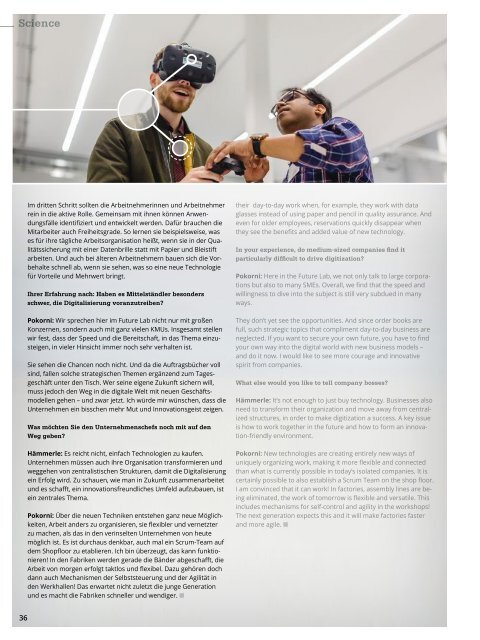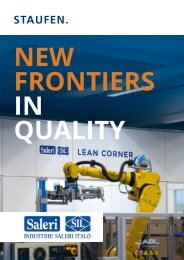staufen magazine 2019 | No.2
A journal for change from STAUFEN.AG INSIDE EVERY COMPANY THERE IS AN EVEN BETTER ONE. Facing the current megatrend of individualization, factors which connect us with each other are receding into the background more and more in our fragmented society. Corporate management and leadership can and must be innovative and successful, even in such a fragmented world. And you can see confirmation of this in the real-life examples and interviews with experts presented in this issue. No matter whether the business in question is a startup or a global market leader, it is the team and not the individual person that determines a company’s success and adaptability. A venue for exchanging ideas and coming together is the new staufen magazine. We hope you enjoy reading our articles, and we hope it provokes many thoughtful and inspiring conversations with colleagues and employees.
A journal for change from STAUFEN.AG
INSIDE EVERY COMPANY THERE IS AN EVEN BETTER ONE.
Facing the current megatrend of individualization, factors which connect us with each other are receding into the background more and more in our fragmented society.
Corporate management and leadership can and must be innovative and successful, even in such a fragmented world. And you can see confirmation of this in the real-life examples and interviews with experts presented in this issue. No matter whether the business in question is a startup or a global market leader, it is the team and not the individual person that determines a company’s success and adaptability.
A venue for exchanging ideas and coming together is the new staufen magazine. We hope you enjoy reading our articles, and we hope it provokes many thoughtful and inspiring conversations with colleagues and employees.
Create successful ePaper yourself
Turn your PDF publications into a flip-book with our unique Google optimized e-Paper software.
Science<br />
Im dritten Schritt sollten die Arbeitnehmerinnen und Arbeitnehmer<br />
rein in die aktive Rolle. Gemeinsam mit ihnen können Anwendungsfälle<br />
identifiziert und entwickelt werden. Dafür brauchen die<br />
Mitarbeiter auch Freiheitsgrade. So lernen sie beispielsweise, was<br />
es für ihre tägliche Arbeitsorganisation heißt, wenn sie in der Qualitätssicherung<br />
mit einer Datenbrille statt mit Papier und Bleistift<br />
arbeiten. Und auch bei älteren Arbeitnehmern bauen sich die Vorbehalte<br />
schnell ab, wenn sie sehen, was so eine neue Technologie<br />
für Vorteile und Mehrwert bringt.<br />
Ihrer Erfahrung nach: Haben es Mittelständler besonders<br />
schwer, die Digitalisierung voranzutreiben?<br />
Pokorni: Wir sprechen hier im Future Lab nicht nur mit großen<br />
Konzernen, sondern auch mit ganz vielen KMUs. Insgesamt stellen<br />
wir fest, dass der Speed und die Bereitschaft, in das Thema einzusteigen,<br />
in vieler Hinsicht immer noch sehr verhalten ist.<br />
Sie sehen die Chancen noch nicht. Und da die Auftragsbücher voll<br />
sind, fallen solche strategischen Themen ergänzend zum Tagesgeschäft<br />
unter den Tisch. Wer seine eigene Zukunft sichern will,<br />
muss jedoch den Weg in die digitale Welt mit neuen Geschäftsmodellen<br />
gehen – und zwar jetzt. Ich würde mir wünschen, dass die<br />
Unternehmen ein bisschen mehr Mut und Innovationsgeist zeigen.<br />
Was möchten Sie den Unternehmenschefs noch mit auf den<br />
Weg geben?<br />
Hämmerle: Es reicht nicht, einfach Technologien zu kaufen.<br />
Unternehmen müssen auch ihre Organisation transformieren und<br />
weggehen von zentralistischen Strukturen, damit die Digitalisierung<br />
ein Erfolg wird. Zu schauen, wie man in Zukunft zusammenarbeitet<br />
und es schafft, ein innovationsfreundliches Umfeld aufzubauen, ist<br />
ein zentrales Thema.<br />
Pokorni: Über die neuen Techniken entstehen ganz neue Möglichkeiten,<br />
Arbeit anders zu organisieren, sie flexibler und vernetzter<br />
zu machen, als das in den verinselten Unternehmen von heute<br />
möglich ist. Es ist durchaus denkbar, auch mal ein Scrum-Team auf<br />
dem Shopfloor zu etablieren. Ich bin überzeugt, das kann funktionieren!<br />
In den Fabriken werden gerade die Bänder abgeschafft, die<br />
Arbeit von morgen erfolgt taktlos und flexibel. Dazu gehören doch<br />
dann auch Mechanismen der Selbststeuerung und der Agilität in<br />
den Werkhallen! Das erwartet nicht zuletzt die junge Generation<br />
und es macht die Fabriken schneller und wendiger. ■<br />
their day-to-day work when, for example, they work with data<br />
glasses instead of using paper and pencil in quality assurance. And<br />
even for older employees, reservations quickly disappear when<br />
they see the benefits and added value of new technology.<br />
In your experience, do medium-sized companies find it<br />
particularly difficult to drive digitization?<br />
Pokorni: Here in the Future Lab, we not only talk to large corporations<br />
but also to many SMEs. Overall, we find that the speed and<br />
willingness to dive into the subject is still very subdued in many<br />
ways.<br />
They don‘t yet see the opportunities. And since order books are<br />
full, such strategic topics that compliment day-to-day business are<br />
neglected. If you want to secure your own future, you have to find<br />
your own way into the digital world with new business models –<br />
and do it now. I would like to see more courage and innovative<br />
spirit from companies.<br />
What else would you like to tell company bosses?<br />
Hämmerle: It‘s not enough to just buy technology. Businesses also<br />
need to transform their organization and move away from centralized<br />
structures, in order to make digitization a success. A key issue<br />
is how to work together in the future and how to form an innovation-friendly<br />
environment.<br />
Pokorni: New technologies are creating entirely new ways of<br />
uniquely organizing work, making it more flexible and connected<br />
than what is currently possible in today‘s isolated companies. It is<br />
certainly possible to also establish a Scrum Team on the shop floor.<br />
I am convinced that it can work! In factories, assembly lines are being<br />
eliminated, the work of tomorrow is flexible and versatile. This<br />
includes mechanisms for self-control and agility in the workshops!<br />
The next generation expects this and it will make factories faster<br />
and more agile. ■<br />
36

















